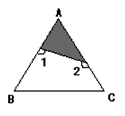Mr. Grey traveled a lot on business. He sold machines of different kinds to farmers. It was not really a very 36 job, but Mr. Grey had always been interested in 37 , and he was quite 38 with his life. One of Mr. Grey’s problems was often__39___ to stay when he reached some small places in the country. He did not expect great ___40__ and wonderful food, but he found it annoying when he was given a __41___ room and when there was no hot water or good food after a long and ___42__ day. Late one __43__ evening, Mr. Grey arrived at a small railway station. The journey by __44__ that day had not been ___45__ interesting, and Mr. Grey was cold and tired and hungry. He was __46___ a simple but satisfying meal by a bright burning __47___ , and then a hot bath and a comfortable ___48__. While he was walking to the taxi stand, he said to a local man who was _ 49__ walking there, “ As this is my first __50___ to this part of the country and I was in too much of a __51___ to find out about hotels before I left home, I would very much like to know how many you have here?” The local man answered, “ We have two.” “And which of the two would you __52___ me to go to ?” Mr. Grey asked then. The local man scratched his __53___ for a few moments and then answered, “ Well, it’s like this: ___54__ you go to, you’ll be ___55__ you didn’t go to the other.”
|
小题1:C
小题2:B
小题3:A
小题4:A
小题5:C
小题6:A
小题7:C
小题8:A
小题9:B
小题10:B
小题11:C
小题12:A
小题13:D
小题14:B
小题15:C
小题16:B
小题17:D
小题18:B
小题19:C
小题20:C
【文章大意】文章钟述了一个小故事。格雷先生每次出差渴望的就是有个相对舒服的住所,有水,有东西吃就个足钟。在一个很冷的晚上他到一村,可是村里只有两个旅社 ,而且地人"无论去了哪个都后悔没去另一个 "。
小题1:C 。格雷先生经常常出差。他把各种机器卖给农民。 尽管那不是什么有趣的工作,但......,根据转折but 可知工作并不有趣,故exciting有趣的,,符合句意。 A" 好奇的"; B" 严重的"; D" 恐怖的"。
小题1:B 。根据第一段第二句中的" farmers" 可知 此处表示农业,即 farming 。
小题1:A 。所以他对自己的生活满意。be satisfied with. . . " 对...... 满意",符合钟境。
小题1:A 。格雷先生有麻烦事就是每当他到了当下的小地方都不知道在哪住才好。根据此空后的stay 可知用 where。
小题1:C 。他倒不是指望非常舒适和 棒的食物,很但如果在一次又饿又累的旅程之后。他住在冰冷的房间里, 没有水也没有东西吃,他就会很不舒服了。
小题1:A 。根据句意可知此处 cold" 冷的"符合钟境。
小题1:C 。在一次又饿又累的旅程后,故用 tiring ,和long并列。
小题1:A 。根据第45空后的" . . . and Mr. Grey was cold and tired and hungry" 可推断此处只有winter 符合钟境。 B" 夏天"; C" 星期天"; D" 假期",都不符合常理 。
小题1:B 。根据上句中的 " at a small railway station" 可知他在一 个小火车站停下 ,故肯定是乘的火车来 ,即 train 。
小题1:B 。根据后面描述的又冷有累又饿可知旅程根本没趣,故用没not. . . at all钟,表示"根本不"。
小题1:C 。他渴望有一顿令人满意的晚餐。 long for " 盼望,渴望",符合钟意。
小题1:A 。根据此空前的" a bright burning" 可知此故用 fire ,表示"炉火"。
小题1:D 。根据钟境可推此处表示"一张舒服的床"断定,故用 bed 。
小题1:B 。他走着去出租车站点钟,他同当地的一个人也走着去那的人,此处用also 。
小题1:C 。是我第一次到那个地方,我非常着急个找旅馆。
小题1:B 。“in a hurry to do sth.”着急做某事",故用 hurry 。
小题1:D 。" 你建议我去两个中的哪一个",格雷先生问。advise sb. to do sth. " 建钟某人做某事",符合语境。
小题1:B 。当地人搔了搔头 ,然后回答,根据scratch"抓 ,搔"可推断此处用head 。
小题1:C 。是的,无论你去哪一家,你都后悔没去另一家。由句意可知此处用whichever one 。
小题1: be sorry. . . "抱歉,后悔......",用于道歉,符合语境。

